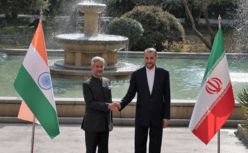Stay invested : On Chabahar and India-Iran ties
India should not tailor its ties with Iran to U.S. foreign policy changes
By signing a 10-year agreement with Iran to develop and operate the Chabahar port, India has taken its infrastructure and trade partnership with the Islamic Republic to the next level despite tensions in West Asia. India will invest $120 million and offer a credit facility of $250 million to further develop the terminal it operates in Chabahar’s Shahid Beheshti port and related projects. However, after the deal was signed, the U.S. State Department said entities considering business deals with Iran “need to be aware that they are opening themselves up to and the potential risk of sanctions ”. In the past, American sanctions on Iran had delayed the project. Conceived in 2003, the project did not take-off for years after the U.S. and the UN imposed sanctions on Tehran over its nuclear programme. India signed a memorandum of understanding in 2015 after Washington eased sanctions on Iran following that year’s nuclear agreement, and in 2016, the contract was executed during Prime Minister Narendra Modi’s Iran visit. The U.S.’s unilateral withdrawal from the nuclear deal in 2018 and reimposition of sanctions on Iran raised questions on India’s continued cooperation with Tehran. But India managed to win a carve-out from U.S. sanctions that allowed it to operate the port through ad-hoc measures.
The Chabahar port is critical for India’s connectivity plans. First, it offers an alternative route to Afghanistan and Central Asia by bypassing Pakistan, allowing better trade with Central Asia. And, Chabahar is expected to be connected to the International North-South Transport Corridor (NSTC), bringing India closer to Europe through Iran, Azerbaijan and Russia. An alternative to the Suez route, a fully operational NSTC would reduce the time and money spent on intercontinental trade. The port, roughly 200 km from Pakistan’s Gwadar, where China is developing a port as part of its BRI, would also help India expand its geopolitical influence in Central Asia. But the U.S. seems to have taken a narrow view of the project over its hostility with Iran. America’s interests in the region have also changed. In 2018, when U.S. forces were backing the Islamic Republic government in Afghanistan, it gave a sanctions waiver to India as Kabul also stood-to benefit from the port project. Today, U.S. troops are out of Afghanistan, the Taliban has replaced the Islamic Republic, and the U.S.’s focus is on containing Iran. India, in the past, had taken U-turns in its Iran engagement depending on the policy changes in Washington DC. It should not do that any more. It should stay invested in Chabahar and seek to improve its trade and connectivity projects with Central Asia, which is essential for India’s continued rise.
